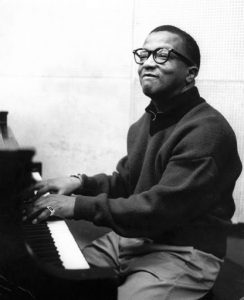
Induction: 2021
Website: Billy Strayhorn
Billy Strayhorn (by David Hajdu)
February 6, 2021
William Thomas “Billy” Strayhorn was a creative artist of extraordinary breadth, depth, and originality. From his beginnings as a precociously gifted teenage musician until his death at age 51 in 1967, Strayhorn made music that gave voice to a widely diverse range of aesthetic values and dimensions of human experience, drawing on everything from the blues and swing to the classical tradition, musical theater, and art song. More significantly, perhaps, he did so with palpable conviction and heart. His work, for all its complexity and technical sophistication, is indelible for its unique capacity to stir the heart as well as the body and the mind.
While still a young man in his native Pittsburgh, Strayhorn had already created his signature work, the distingue masterpiece “Lush Life.” He had written both words and music for songs including the standard “Something to Live For”; had composed instrumental hybrids of classicism and jazz such as a concerto for piano and tympani; and had written words, music, book, and ensemble arrangements for the musical Fantastic Rhythm. Invited by Duke Ellington to contribute to his renowned orchestra, Strayhorn became nothing less than a transformative force in American music, stretching the ears of musicians and audiences with compositions such as “Chelsea Bridge,” “Passion Flower,” and “A Flower Is a Lovesome Thing.” His best-loved piece is surely “Take the ‘A’ Train,” which became not only the theme song of the Ellington Orchestra but the leitmotif of mid-century America.
Composers and arrangers in and beyond jazz have admired Strayhorn deeply ever since musicians began to recognize his importance as a master innovator working largely behind the scenes. In the words of the late composer, arranger, and saxophonist Gerry Mulligan, “When Strayhorn came on the scene, he just blew us away, because he was doing very complicated things, and they didn’t sound complicated to the ear at all — they sounded completely natural and very emotional. To bring all that complexity to bear and have it be so beautiful was something incredible.”
Duke Ellington, the composer who knew Strayhorn best, admired him the most. “His greatest virtue, I think, was his honesty — not only to others, but to himself,” Ellington said in his eulogy to Strayhorn, who was openly gay in an era of widespread homophobia. “He had no aspirations to enter into any kind of competition, yet the legacy he leaves, his oeuvre, will never be less than the ultimate on the highest plateau of culture.”
David Hajdu is the author of Lush Life: A Biography of Billy Strayhorn and other books.
